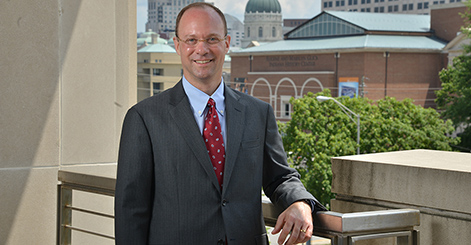Lawyer Limelight: Dean Andrew Klein
By Margot Slade | February 24, 2014 | Lawyer Limelights

Photo provided by the law school
Andrew Klein is the personification of home grown and groomed legal academic talent. Klein, dean of Indiana University Robert H. McKinney School of Law in Indianapolis, was announced in 2013 as the university’s undisputed choice after a yearlong search. At the time, he was chief of staff in the university Chancellor’s Cabinet, which includes overseeing the intercollegiate athletic program, and had taken on additional responsibilities as associate vice chancellor for academic affairs.
He was also a longtime and much honored member of the law school family, having been on its faculty since 2000 and serving as associate dean for academic affairs from 2004 to 2007. Klein attended the University of Wisconsin, graduating with distinction in journalism and economics. He received his JD with distinction from Emory University School of Law in 1988, where he served as editor-in-chief of the Emory Law Journal. His research focuses on torts and environmental law.
Lawdragon: Describe your path to academia. What drew you into the field?
Andrew Klein: It was a combination of two factors. I enjoy engaging new ideas, and I take satisfaction in helping others succeed. Being a law professor is a job where both are front and center. I started teaching in 1992, after practicing at Sidley & Austin in Chicago. Before that, I clerked for Judge Joseph Hatchett of the Eleventh Circuit U.S. Court of Appeals. I attended law school at Emory University, where my teachers were wonderful mentors. I have viewed my own career as a form of paying it forward.
LD: What distinguishes the Robert H. McKinney School of Law from other law schools?
AK: Our law school has some special qualities that make it an excellent place to study law. We are located in the heart of Indianapolis, the 13th largest city in the country. We are the only law school in Indianapolis, which is a tremendous advantage for students who seek part-time work or experience through our school’s externships with institutions ranging from the NCAA, whose headquarters are across the street from our school, to Eli Lilly & Co. to Indiana University Hospital.
Our school is literally down the street from the Indiana State Capitol, and this proximity allows us to offer opportunities for students to work in virtually every part of our state government. Our school is widely known for its strength in health law. Our legal writing program is one of the best in the country. We have a number of vibrant live-client clinics. And we offer robust opportunities for students interested in international law, including a longstanding program in international human rights.
LD: What are your biggest challenges as dean, and how are you meeting them?
AK: Like many schools, our biggest challenge is preparing students to succeed as legal professionals in the years ahead. We are meeting the challenge by embracing our partnerships within a supportive community that shares our interest in ensuring a new generation of lawyers and leaders. These strong relationships have led to experiential opportunities for students, with a goal of having those experiences become a springboard for future employment.
LD: Are you seeing any trends in the types of jobs your students take after graduation?
AK: Because of our location and our proximity to government and business, our graduates have long taken a more diverse range of career paths than graduates from other schools. Regarding trends, we continue to see a large number of graduates in government work. We also are seeing increasing numbers of students strike out as entrepreneurs early in their careers.
LD: What do you do outside the law school when you’re not being dean?
AK: Sometimes it seems like not much! That said, I enjoy staying involved in the community – something that is important for a dean of an urban law school. I serve on several nonprofit boards, and have long been a supporter of educational and youth sports programs. One organization where I hold a board seat is Play Ball Indiana, a local affiliate of the national Reviving Baseball in Inner Cities (RBI) program, which is supported by Major League Baseball. RBI helps provide city youth opportunities to play baseball and softball in the summer, and does a lot to improve the lives of young people throughout the country. I would be remiss if I failed to say that I enjoy spending time with my wife, two sons and our dog, Nigel – an energetic Collie.

